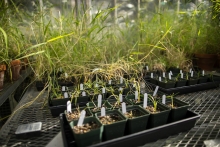Dry Conditions May Have Helped a New Type of Plant Gain a Foothold on Earth

In the dramatically changing conditions of ancient Earth, organisms had to evolve new strategies to keep up. From the mid-Oligocene, roughly 30 million years ago, to the mid-to-late Miocene, about 5 million years ago, carbon dioxide concentrations in the atmosphere fell by a roughly a third. This same period saw the emergence of a new form of photosynthesis in a subset of plants, the C4 pathway. Present in a subset of plants, the C4 pathway supplemented the earlier C3 photosynthetic pathway, meaning those species now reaped energy from the sun using two different strategies.
Researchers have long believed that falling carbon dioxide levels drove the origin of plants with this innovation, but a new study in the Proceedings of the National Academy of Sciences, based on biochemical modeling by a group led by Penn biologists and paleoclimate modeling by a group at Purdue University, indicates that water availability may have been the critical factor behind the emergence of C4 plants.
“The initial origin of C4, which happened when atmospheric carbon dioxide was still very high, seems driven by water limitation,” says Haoran Zhou, a graduate student in the Department of Biology and first author on the paper. “Then later, about 5 to 8 million years ago, there’s a large expansion of C4 grasslands. That’s because carbon dioxide was getting lower and lower. Carbon dioxide and light intensity were actually the limiting factors favoring C4 at that time.”
Click here to read the full story.





